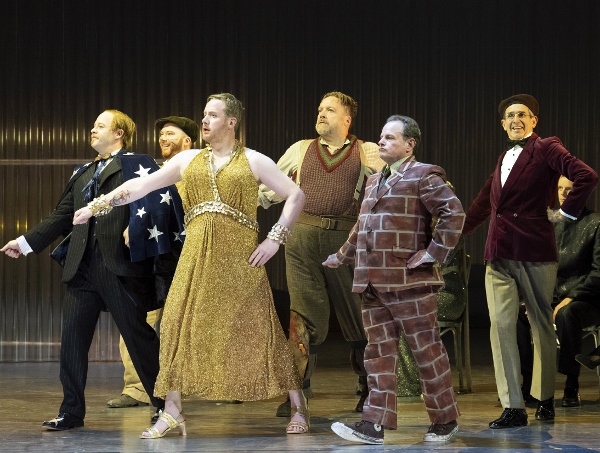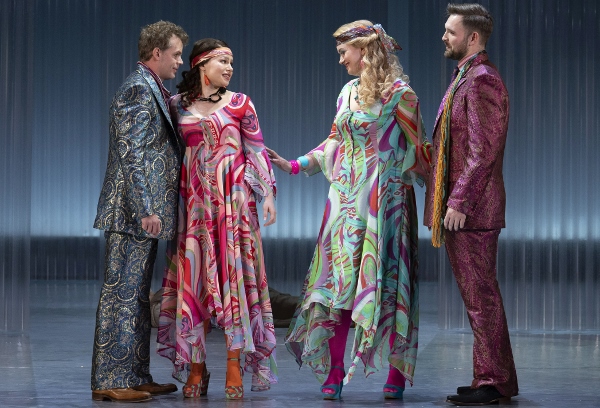A Midsummer Night’s Dream, Opera North review - one of the best and funniest | reviews, news & interviews
A Midsummer Night’s Dream, Opera North review - one of the best and funniest
A Midsummer Night’s Dream, Opera North review - one of the best and funniest
Perspex and bubblewrap for a Sixties take on Britten's Shakespeare

Martin Duncan’s 2008 production of A Midsummer Night’s Dream remains one of the best and funniest things Opera North has ever done – back now again (it was also seen in 2013-14), in the company’s autumn season of revivals.
The idea, hinted at in the staging and suggested in its original publicity, that Britten’s vision of Shakespeare’s enchanted world could be presented in terms of “psychedelia” and even likened to an acid trip, on the grounds that those things were part of the 1960s and Britten completed his opera in 1960, is, strictly speaking, a minor anachronism. Such things came late in the decade, not at the beginning of it … though you might suggest that Britten was ahead of his time, I suppose.
But the thing is that it works anyway, and the panels and shifting sheets of translucent Perspex (and the hovering pieces of giant Bubblewrap over the stage), together with the costumes of Ashley Martin-Davies – glittery for Oberon and Tytania, garishly colourful and sixties-style patterned for the young lovers – are as good a setting as any attempt at a forest and its people.  The costumes, with the fairies in white with identical blonde wigs like the children in Village of the Damned (an idea from the original 1960 production at Aldeburgh), and Shakespeare’s comic “mechanicals” in contemporary dress according to their trades, are vital to its visual impressions, and it’s appropriate to remember that when the production was new it was one of three Shakespeare-based operas created by this company with a common designer. Johan Engels had to allow for the possibility that any two might be staged on the same day, matinee and evening, so there wasn’t much scope for traditional sets. And he had a limited budget, too, as he bewailed when I interviewed him about it at the time.
The costumes, with the fairies in white with identical blonde wigs like the children in Village of the Damned (an idea from the original 1960 production at Aldeburgh), and Shakespeare’s comic “mechanicals” in contemporary dress according to their trades, are vital to its visual impressions, and it’s appropriate to remember that when the production was new it was one of three Shakespeare-based operas created by this company with a common designer. Johan Engels had to allow for the possibility that any two might be staged on the same day, matinee and evening, so there wasn’t much scope for traditional sets. And he had a limited budget, too, as he bewailed when I interviewed him about it at the time.
The result was that everything depended on the performers’ skills, and it still does. With Matthew Eberhardt as revival director and a very well chosen cast, that has made this presentation a complete success.
Since Britten and Peter Pears simply used Shakespeare as their librettist, they could hardly go wrong, and I loved the comedic part of this production most on previous occasions. The send-up of amateur theatre presented in the “most lamentable comedy” of Pyramus and Thisbe (pictured above) is wonderfully done: there are plenty of clever details such as the group hug shared by the mechanicals before they start their show, and their hilariously disjointed “bergomask” dance at the end (choreography credit to Ben Wright).
The most welcome thing is that Henry Waddington is back for the third time as Bottom the weaver. When he had to omit the tour performances last time round we certainly missed his manly form, and his theatrical instincts and sheer vocal quality are still the highlight of the show. He’s well backed up by Dean Robinson (Peter Quince), Nicholas Watts (Francis Flute), Frazer Scott (Snug the joiner), Colin Judson (Snout the tinker) and Nicholas Butterfield (Starveling the tailor). Daniel Abelson reprises his at times almost Gollum-like speaking role of Puck, too, to excellent effect.  The youngsters are Siân Griffiths as a feisty Hermia, Camilla Harris as a delightful Helena, James Newby as a likeable gormless Demetrius, and Peter Kirk as an endearingly dumb Lysander – all delivering the musical goods with skill (pictured above). James Laing and Daisy Brown are well-matched (if ill-met by moonlight) as Oberon and Tytania, and Andri Björn Róbertsson and Molly Barker make an imposing Theseus (I liked his imitation-royal comment to the lion to “Make him roar again” in the Pyramus and Thisbe scene) and Hippolyta. The children’s chorus of fairies do their songs and a lot of dance moves very well, with Kitty Moore, Dougie Sadgrove, Lucy Eatock and Jessie Thomas confident little characters.
The youngsters are Siân Griffiths as a feisty Hermia, Camilla Harris as a delightful Helena, James Newby as a likeable gormless Demetrius, and Peter Kirk as an endearingly dumb Lysander – all delivering the musical goods with skill (pictured above). James Laing and Daisy Brown are well-matched (if ill-met by moonlight) as Oberon and Tytania, and Andri Björn Róbertsson and Molly Barker make an imposing Theseus (I liked his imitation-royal comment to the lion to “Make him roar again” in the Pyramus and Thisbe scene) and Hippolyta. The children’s chorus of fairies do their songs and a lot of dance moves very well, with Kitty Moore, Dougie Sadgrove, Lucy Eatock and Jessie Thomas confident little characters.
Opera North’s music director Garry Walker handles the score deftly – the first string glissandi scarcely audible as the world of magic and sprites comes into view, but the rest full of life, precision and energy.
- Further performances on 19, 24 and 31 October at Leeds Grand Theatre, 6 November at Newcastle Theatre Royal, 13 November at The Lowry, Salford, and 20 November at Nottingham Theatre Royal
The future of Arts Journalism
You can stop theartsdesk.com closing!
We urgently need financing to survive. Our fundraising drive has thus far raised £49,000 but we need to reach £100,000 or we will be forced to close. Please contribute here: https://gofund.me/c3f6033d
And if you can forward this information to anyone who might assist, we’d be grateful.

Subscribe to theartsdesk.com
Thank you for continuing to read our work on theartsdesk.com. For unlimited access to every article in its entirety, including our archive of more than 15,000 pieces, we're asking for £5 per month or £40 per year. We feel it's a very good deal, and hope you do too.
To take a subscription now simply click here.
And if you're looking for that extra gift for a friend or family member, why not treat them to a theartsdesk.com gift subscription?
more Opera
 The Makropulos Case, Royal Opera - pointless feminist complications
Katie Mitchell sucks the strangeness from Janáček’s clash of legalese and eternal life
The Makropulos Case, Royal Opera - pointless feminist complications
Katie Mitchell sucks the strangeness from Janáček’s clash of legalese and eternal life
 First Person: Kerem Hasan on the transformative experience of conducting Jake Heggie's 'Dead Man Walking'
English National Opera's production of a 21st century milestone has been a tough journey
First Person: Kerem Hasan on the transformative experience of conducting Jake Heggie's 'Dead Man Walking'
English National Opera's production of a 21st century milestone has been a tough journey
 Madama Butterfly, Irish National Opera review - visual and vocal wings, earthbound soul
Celine Byrne sings gorgeously but doesn’t round out a great operatic character study
Madama Butterfly, Irish National Opera review - visual and vocal wings, earthbound soul
Celine Byrne sings gorgeously but doesn’t round out a great operatic character study
 theartsdesk at Wexford Festival Opera 2025 - two strong productions, mostly fine casting, and a star is born
Four operas and an outstanding lunchtime recital in two days
theartsdesk at Wexford Festival Opera 2025 - two strong productions, mostly fine casting, and a star is born
Four operas and an outstanding lunchtime recital in two days
 The Railway Children, Glyndebourne review - right train, wrong station
Talent-loaded Mark-Anthony Turnage opera excursion heads down a mistaken track
The Railway Children, Glyndebourne review - right train, wrong station
Talent-loaded Mark-Anthony Turnage opera excursion heads down a mistaken track
 La bohème, Opera North review - still young at 32
Love and separation, ecstasy and heartbreak, in masterfully updated Puccini
La bohème, Opera North review - still young at 32
Love and separation, ecstasy and heartbreak, in masterfully updated Puccini
 Albert Herring, English National Opera review - a great comedy with depths fully realised
Britten’s delight was never made for the Coliseum, but it works on its first outing there
Albert Herring, English National Opera review - a great comedy with depths fully realised
Britten’s delight was never made for the Coliseum, but it works on its first outing there
 Carmen, English National Opera review - not quite dangerous
Hopes for Niamh O’Sullivan only partly fulfilled, though much good singing throughout
Carmen, English National Opera review - not quite dangerous
Hopes for Niamh O’Sullivan only partly fulfilled, though much good singing throughout
 Giustino, Linbury Theatre review - a stylish account of a slight opera
Gods, mortals and monsters do battle in Handel's charming drama
Giustino, Linbury Theatre review - a stylish account of a slight opera
Gods, mortals and monsters do battle in Handel's charming drama
 Susanna, Opera North review - hybrid staging of a Handel oratorio
Dance and signing complement outstanding singing in a story of virtue rewarded
Susanna, Opera North review - hybrid staging of a Handel oratorio
Dance and signing complement outstanding singing in a story of virtue rewarded
 Ariodante, Opéra Garnier, Paris review - a blast of Baroque beauty
A near-perfect night at the opera
Ariodante, Opéra Garnier, Paris review - a blast of Baroque beauty
A near-perfect night at the opera
 Cinderella/La Cenerentola, English National Opera review - the truth behind the tinsel
Appealing performances cut through hyperactive stagecraft
Cinderella/La Cenerentola, English National Opera review - the truth behind the tinsel
Appealing performances cut through hyperactive stagecraft

Add comment